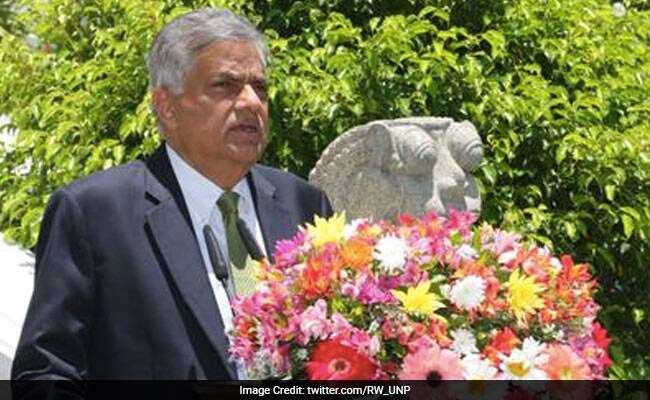
Former strongman Ranil Wickremesinghe needs 113 votes in the 225-member Parliament to defeat the motion
Colombo:
Sri Lanka's Joint Opposition today moved a no-confidence motion against embattled Prime Minister Ranil Wickremesinghe, a step that could threaten the country's unity government.
The motion was handed over to Speaker Karu Jayasuriya by the Joint Opposition and was debated today in the Parliament.
The Joint Opposition has accused 68-year-old Mr Wickremesinghe of financial mismanagement and failing to tackle anti-Muslim riots last month in the central Kandy district.
Former strongman Mr Wickremesinghe needs 113 votes in the 225-member Parliament to defeat the motion.
Speaking at the motion against the prime minister, R Sampanthan, Tamil National Alliance (TNA) leader, stressed on the need to resolve the ethnic conflict which had plagued the island.
"I see this is the first step of a plan to bring down the government by going against the mandate received in 2015," Mr Sampanthan told the Parliament.
Recalling that the government had proposed a constitutional process to resolve the long standing issue, Mr Sampanthan appealed to the senior members of the Joint Opposition to come together in the task of bringing permanent peace and unity.
"We can become the economic hub in the Indian Ocean if we have lasting peace in the country," Mr Sampanthan said.
The TNA is expected to vote in favour of Wickremesinghe, giving the premier an advantage in the vote.
Reports coming from the Sri Lanka Freedom Party (SLFP) faction of President Maithripala Sirisena suggested that the party was split in the vote.
The veteran minister AHM Fowzie said that party will abstain while Lakshman Yapa Abeywardene, a minister of State, said that party would vote against Wickremesinghe.
The motion said the House has lost confidence in Wickremesinghe due to the alleged scam in the issue of Central Bank of Sri Lanka Bonds in 2015 and his appointment of a non national as the governor.
Mr Wickremesinghe's UNP claimed that the premier would survive the vote easily with backing from minority Tamil and Muslim parties.
Wickremesinghe had resisted a call from Sirisena to resign following a crushing defeat to former president Mahinda Rajapaksa's new party Sri Lanka People's Front in the February 10 local election.
It is no secret that Sirisena wants Wickremesinghe's ouster so that he could replace him with his own choice.
Mr Wickremesinghe was recently replaced as law and order minister after clashes erupted in the Kandy district.
The President also removed key institutions, including the Central Bank, from the control of Ranil Wickremesinghe.
Sirisena in 2015 quit the Rajapaksa government to join hands with Wickremesinghe, the then main opposition leader, to defeat Rajapaksa in the presidential election ending his 10-year rule.
Constitutionally, the current Parliament could not be dissolved before February 2020. It requires a motion adopted with two-third in the 225 member assembly to call for snap elections.
The motion was handed over to Speaker Karu Jayasuriya by the Joint Opposition and was debated today in the Parliament.
The Joint Opposition has accused 68-year-old Mr Wickremesinghe of financial mismanagement and failing to tackle anti-Muslim riots last month in the central Kandy district.
Former strongman Mr Wickremesinghe needs 113 votes in the 225-member Parliament to defeat the motion.
Speaking at the motion against the prime minister, R Sampanthan, Tamil National Alliance (TNA) leader, stressed on the need to resolve the ethnic conflict which had plagued the island.
"I see this is the first step of a plan to bring down the government by going against the mandate received in 2015," Mr Sampanthan told the Parliament.
Recalling that the government had proposed a constitutional process to resolve the long standing issue, Mr Sampanthan appealed to the senior members of the Joint Opposition to come together in the task of bringing permanent peace and unity.
"We can become the economic hub in the Indian Ocean if we have lasting peace in the country," Mr Sampanthan said.
The TNA is expected to vote in favour of Wickremesinghe, giving the premier an advantage in the vote.
Reports coming from the Sri Lanka Freedom Party (SLFP) faction of President Maithripala Sirisena suggested that the party was split in the vote.
The veteran minister AHM Fowzie said that party will abstain while Lakshman Yapa Abeywardene, a minister of State, said that party would vote against Wickremesinghe.
The motion said the House has lost confidence in Wickremesinghe due to the alleged scam in the issue of Central Bank of Sri Lanka Bonds in 2015 and his appointment of a non national as the governor.
Mr Wickremesinghe's UNP claimed that the premier would survive the vote easily with backing from minority Tamil and Muslim parties.
Wickremesinghe had resisted a call from Sirisena to resign following a crushing defeat to former president Mahinda Rajapaksa's new party Sri Lanka People's Front in the February 10 local election.
It is no secret that Sirisena wants Wickremesinghe's ouster so that he could replace him with his own choice.
Mr Wickremesinghe was recently replaced as law and order minister after clashes erupted in the Kandy district.
The President also removed key institutions, including the Central Bank, from the control of Ranil Wickremesinghe.
Sirisena in 2015 quit the Rajapaksa government to join hands with Wickremesinghe, the then main opposition leader, to defeat Rajapaksa in the presidential election ending his 10-year rule.
Constitutionally, the current Parliament could not be dissolved before February 2020. It requires a motion adopted with two-third in the 225 member assembly to call for snap elections.
Track Latest News Live on NDTV.com and get news updates from India and around the world

